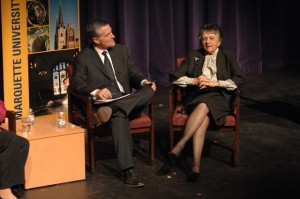 Jess Dickinson was on a roll, his Southern delivery infused with force and emotion. The Constitution is meaningless unless it is effective, said the presiding justice of the Mississippi Supreme Court. It is time, he said with rising voice, for judges to “stand up” and help insure that poor people have equal access to the courts.
Jess Dickinson was on a roll, his Southern delivery infused with force and emotion. The Constitution is meaningless unless it is effective, said the presiding justice of the Mississippi Supreme Court. It is time, he said with rising voice, for judges to “stand up” and help insure that poor people have equal access to the courts.
The audience noted its approval with a standing ovation, but that result was never in doubt. After all, the occasion was the Annual Meeting of State Access to Justice Chairs last Saturday in Jacksonville, a gathering of 168 lawyers, judges and state supreme court justices from over 40 states, Puerto Rico and the District of Columbia, all of whom have signed on to the cause of equal access. There was an understandable enthusiasm for the justice’s remarks.
And the audience included the Honorable Shirley Abrahamson, Chief Justice of the Wisconsin Supreme Court, making a rare but significant appearance at the meeting; significant because in Wisconsin, access to justice has not enjoyed the out-front leadership of the highest court as it has in many other states, including Justice Dickinson’s Mississippi.
The Wisconsin court, principally the Chief Justice, has been active in the cause of self-representation, striving to make the courts more user friendly to those who cannot afford a lawyer. The Court also approved changes to the rules of professional responsibility that paved the way for the expansion of brief advice clinics, and adopted a State Bar petition to create an Access to Justice Commission. The Chief Justice has led the way in promoting the study of limited representation, considered an essential step in addressing the problem of access to the courts.
Most significantly, the court approved the $50 annual assessment that goes to the Wisconsin Trust Account Foundation’s Public Interest Legal Services Fund, providing much needed funds as IOLTA income fell. (One of the more bizarre events I’ve ever witnessed is the State Bar Board of Governors actually debating a proposal to sue the Court because of the assessment.)
But it would be a stretch to say that our Court has been out in front, leading the way on access to justice issues in Wisconsin.


